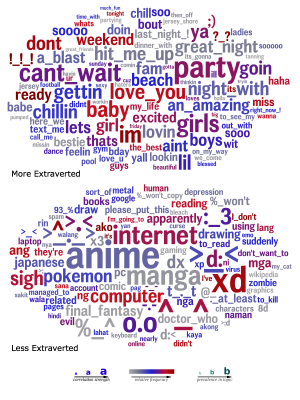News
 In the age of social media, people's inner lives are increasingly recorded through the language they use online. With this in mind, an interdisciplinary group of University of Pennsylvania researchers is interested in whether a computational analysis of this language can provide as much, or more, insight into their personalities as traditional methods used by psychologists, such as self-reported surveys and questionnaires.
In the age of social media, people's inner lives are increasingly recorded through the language they use online. With this in mind, an interdisciplinary group of University of Pennsylvania researchers is interested in whether a computational analysis of this language can provide as much, or more, insight into their personalities as traditional methods used by psychologists, such as self-reported surveys and questionnaires.
In a recent study, published in the journal PLOS ONE, 75,000 people voluntarily completed a common personality questionnaire through a Facebook application and made their Facebook status updates available for research purposes. The researchers then looked for overall linguistic patterns in the volunteers’ language.
Their analysis allowed them to generate computer models that were able to predict the individuals’ age, gender and their responses on the personality questionnaires they took. These prediction models were surprisingly accurate. For example, the researchers were correct 92 percent of the time when predicting users’ gender based only on the language of their status updates.
The success of this “open” approach suggests new ways of researching connections between personality traits and behaviors and measuring the effectiveness of psychological interventions.
The study is part of the World Well-Being Project, an interdisciplinary effort with members of the Computer and Information Science Department in Penn’s School of Engineering and Applied Science and the Department of Psychology and its Positive Psychology Center in the School of Arts and Sciences.
It was led by H. Andrew Schwartz, a postdoctoral fellow in computer and information science and the Positive Psychology Center, and included graduate student Johannes Eichstaedt, postdoctoral fellow Margaret Kern and director Martin Seligman, all of the Positive Psychology Center, as well as professor Lyle Ungar of Computer and Information Science.
The Penn team collaborated with Michal Kosinski and David Stillwell of The Psychometrics Centre at the University of Cambridge, who originally collected the data from Facebook users.


